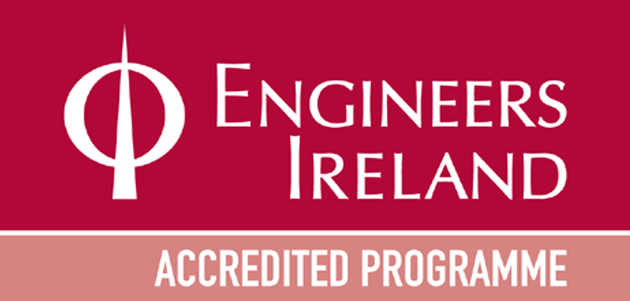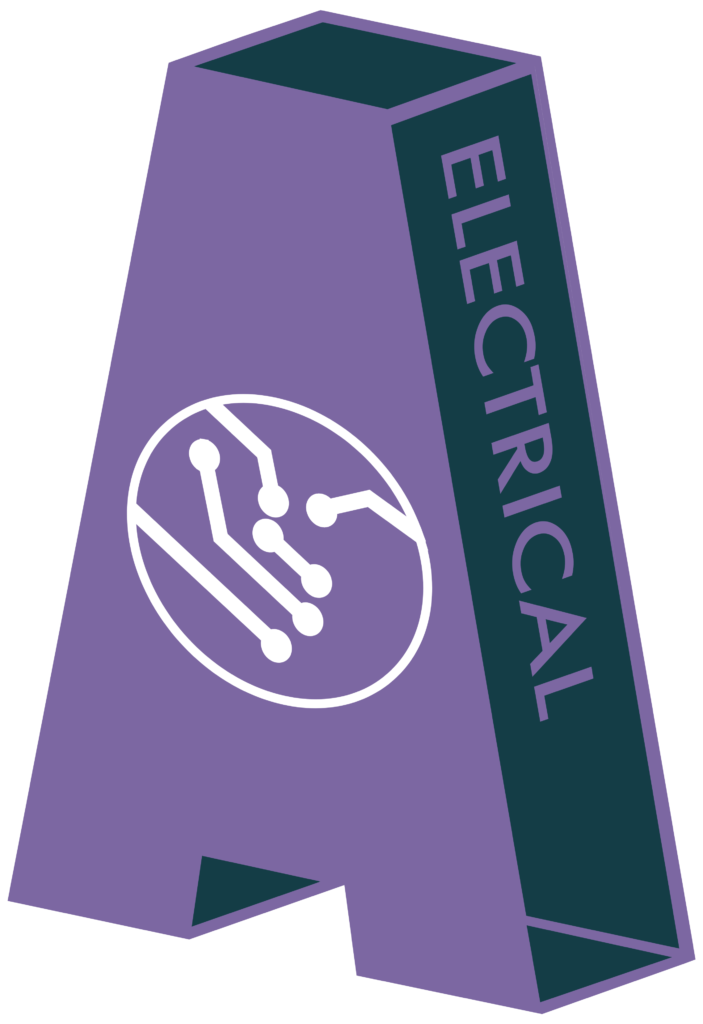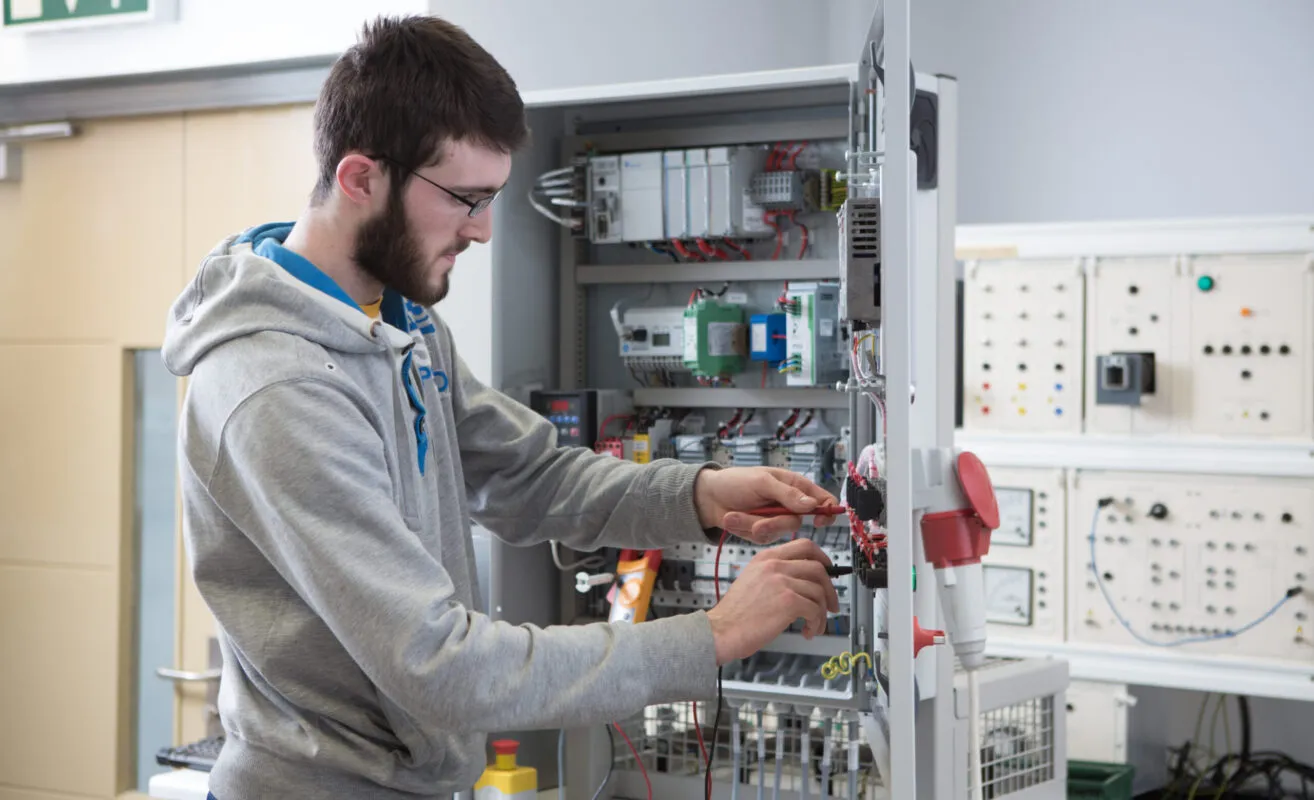

Course Search
Courses
Admissions & Support
Course Search
Our Services
Our Community
Course Search
Governance
Professional Services
Location: Moylish, Limerick City
years: 2

The B.Eng. Industrial Electrical Engineering Apprenticeship Level 7 is a two-year ‘earn and learn’ programme developed in collaboration with the Electrical, Engineering, Automation and Manufacturing sectors to meet the growing demand for skilled Industrial Electrical Engineers in Ireland. The programme is coordinated by the Technological University of the Shannon (TUS) and leads to the award of a Level 7 Bachelor of Engineering degree.
It is specifically designed as a progression route for qualified electricians or technicians with equivalent qualifications who wish to upskill and acquire advanced knowledge to move into engineering roles in industry.
Engineers Ireland professionally accredit this programme. This is an objective evaluation and approval of engineering programmes, ensuring that they meet international standards, the needs of the engineering profession and broader responsibilities to society, environment, and economy. Graduates of accredited programmes, at the appropriate standard, may go on to achieve one of the professional titles of Chartered Engineer, Associate Engineer, and Engineering Technician
Apprentices spend approximately 70% of their time on paid, on-the-job training with an approved employer, and 30% in academic study at TUS. Academic delivery consists of two 15-week full-time blocks over the two years.
Graduates may progress to further study at Level 8 or advance into senior engineering, technical management, and project leadership roles within their sector.


TUS Industrial Electrical Engineering Apprenticeship Office
Email: electricalapprenticeships.midwest@tus.ie
Telephone: 061293070
Applicants for the programme must be employed on an Apprenticeship contract of employment.
Applications to register an apprentice can only be submitted by a Registered Employer.
Applicants must meet the entry requirements as follow:
For further queries on Entry Requirements, please Contact: TUS Industrial Electrical Engineering Apprenticeship Office
Period: September – 21 weeks
Period: January – 15 weeks
Period: May – 18 weeks
Period: September – 15 weeks
Period: January – 35 weeks
An apprenticeship is a programme of structured education and training which formally combines and alternates learning in the workplace with learning in a university, third-level education institution, or training Centre. It is a dual system, blending on-the-job, employer-based learning with off-the-job academic study. Apprentices are paid employees for the duration of the programme and gain nationally recognised qualifications.
Industrial Electrical Engineers design, plan, assess risk, troubleshoot, program and commission a wide range of industrial electrical systems safely and in line with all relevant Irish and EU standards. They also compile system documentation, present proposals, carry out statistical analysis, maintain and repair equipment, and regularly assess the need for upgrading industrial electrical systems.
This is a two-year Apprenticeship. Acaemic block release: 15 weeks per year at a Technological University or third-level institution.
Applicants for the programme must be employed on an Apprenticeship contract of employment.
Applications to register an apprentice can only be submitted by a Registered Employer.
Details of current apprenticeship opportunities are advertised locally and nationally by many employers, and are often listed on the national apprenticeship jobs portal at: https://apprenticeship.ie/career-seekers/jobs
Your local Education and Training Board may hold details of employers seeking to employ an apprentice, visit: https://apprenticeship.ie/more/your-local-provider
Contact TUS Industrial Electrical Engineering Apprenticeship Office.
An apprenticeship is a dual-system education model combining work-based learning with academic study, enabling participants to gain practical industry experience while earning a nationally recognised qualification.
This programme is primarily designed for:
It is suitable for individuals who wish to advance their technical expertise in industrial electrical engineering, automation, and control, and progress into senior engineering or technical management roles.
For further information or queries relating to the entry requirements, please contact:
TUS Industrial Electrical Engineering Apprenticeship Office
Email: electricalapprenticeships.midwest@tus.ie
Tel: 061293070
As part of the national apprenticeship system, there are formal requirements for approval of an employer’s suitability to train apprentices and for registration of apprentices. SOLAS is responsible for delivering on these requirements.
As part of the national apprenticeship system, there are formal requirements for approval of an employer’s suitability to train apprentices and for registration of apprentices. SOLAS is responsible for delivering on these requirements.
Alternatively, please contact: TUS Industrial Electrical Engineering Apprenticeship Office
Email: electricalapprenticeships.midwest@tus.ie
Tel: 061293070
Following submission of an Expression of Interest, a SOLAS Authorised Officer from the relevant Education and Training Board (ETB) will conduct a suitability assessment. This process is straightforward, typically involves a site visit, and is normally completed within 1–2 weeks.
To advertise apprenticeship vacancies for free, please visit: https://apprenticeship.ie/employers/current-employers
For the Level 7 Industrial Electrical Engineering Apprenticeship, mentors must hold a Level 7 qualification in a cognate discipline and have at least four years’ relevant industry experience.
Apprentices are supported by their Industry Mentor, Academic Supervisor, and the programme’s Apprenticeship Manager. They receive academic support during block release and ongoing guidance during industry placements.
For additional guidance and support, please click on the options below: